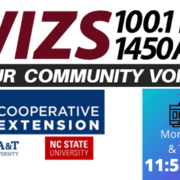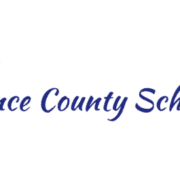Turning Point Community Development Corporation continues its outreach in the area with Community Day 2021 set for Saturday, Aug. 7 from 10 a.m. to 2 p.m.
Turning Point Director Chalis Henderson invites schoolchildren to come out for backpacks stuffed with school supplies and enjoy a variety of activities for the whole family.
Henderson was the guest on Wednesday’s Town Talk and shared details of the event with John C. Rose and Trey Snide.
“Everything’s going to be outside,” she said, except the barbershop. Two barbers will be socially distanced in the large multipurpose room of the Turning Point community engagement building, located near the interchange of Norlina and Warrenton roads in Henderson. Vendors will be distanced appropriately on the lawn. “We will enjoy seeing people, but we definitely want people to feel safe and healthy,” Henderson said.
“We have a large group of community resource vendors – it’s going to be a family-friendly, fun event,” she said. And those 120 backpacks? They’ll be available on a first-come, first-served basis, so come out early.
One note to parents: Henderson said the child should be present to receive the backpack and parents should be prepared to give a name, phone number and the county they live in for the backpack giveaway.
The mobile learning lab will be up and running for the event as well. Henderson said the school bus-turned learning lab has been outfitted with air conditioning, so it will be on the road in August. A couple of young people will be on the bus to provide demonstrations of some of the lab’s functions.
Last year’s Community Day event was cancelled because of the pandemic, which makes this Saturday’s event even more special and important. It’s important for residents in the area to become aware of resources that are available to them, she added.
Established as a community development entity, Turning Point has become a place of empowerment and community engagement. Providing backpacks and having events to share resources are just two ways for Turning Point to “live” its vision statement: We believe rural communities can thrive and flourish.”
Henderson said she was heartened to see so many community members – and parents that are served through Turning Point – show up to bring donations of school supplies to help fill out the backpacks.
The non-profit had gotten the backpacks and a few school supplies, but Henderson said she felt like they needed some more. So she set up a one-week drive to collect supplies and she said there was “an overflow of resources coming in.”
Turning Point will have raffle tickets available on Saturday for the chance to win a complete HVAC system. Tickets are $10, she said. The prize is made possible by Ranes Heating and Air and Henderson said “100 percent of the proceeds go to Turning Point CDC.” The winner will be announced in October. Tickets also may be purchased via a link on its website www.turningpointcdc.org
Also available at the Community Day event are t-shirts emblazoned with the Turning Point vision statement: “We believe rural communities can thrive and flourish.”
Turning Point CDC Director Chalis Henderson Interview Audio. Click Play Below.








